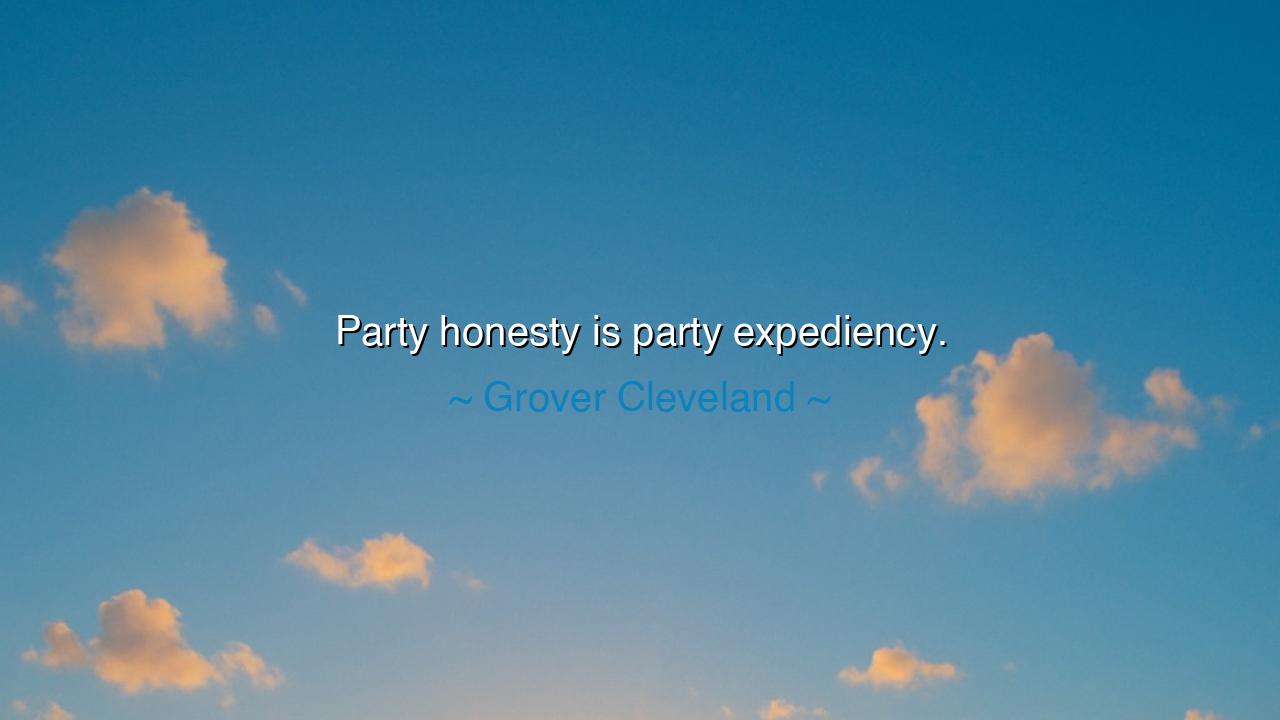
Party honesty is party expediency.






Grover Cleveland, the stern guardian of public trust, once proclaimed: “Party honesty is party expediency.” These words, heavy with the weight of experience, reveal the uneasy marriage between principle and ambition in the realm of politics. For Cleveland, who rose not as a charmer but as a man of stubborn integrity, the lesson was clear: a party that clings to truth and virtue does not act against its own interests, but in fact secures its greatest strength. Honesty, though often scorned as weakness, is the deepest form of expediency, for it builds a foundation that time and trial cannot easily break.
To the unwise, expediency seems the way of quick victories—the compromise, the deception, the convenient lie. Yet Cleveland, weathered by the storms of corruption and betrayal in his age, understood that falsehood brings only fleeting gain, while honesty binds a people to their leaders with cords that cannot be easily severed. He saw that the destiny of a party—indeed, of any institution—rests not in cunning alone, but in the hard stone of trust. A party that betrays the people for momentary gain carves its own downfall.
History bears witness to this truth. Consider the fate of the Whig Party in America, which rose in power but fractured upon the issue of slavery. For expediency’s sake, it sought to straddle the chasm between North and South, between freedom and bondage. In doing so, it lost its moral compass and with it, the loyalty of the people. Its fall was swift, and from its ashes rose the Republican Party, which at its birth dared to take a firmer moral stand. Here is Cleveland’s lesson etched in history: without honesty of principle, expediency destroys itself.
And yet, Cleveland’s words also carry a note of guidance for the wise politician. He does not reject expediency but redeems it. True expediency, he says, lies not in the easy lie but in the harder truth, for the people’s memory is longer than the politician’s term. To be honest is not to be naïve, but to be farsighted—to recognize that the deepest cunning is to build a legacy that endures beyond one election, beyond one generation.
Therefore, O seekers of wisdom, mark well Cleveland’s teaching. Let not the lure of false expediency tempt you, for it is a path of sand. Build instead on the rock of honesty, and know that in politics, as in life, integrity is not the enemy of advantage but its truest form. For the honor of a party is its survival, and its survival depends upon truth.






LTLuu Tam
Is the relationship between party loyalty and honesty one of convenience rather than principle? When party success becomes the driving force behind political decisions, it’s easy to see how honesty might get sacrificed. Does this create a vicious cycle where the truth is continuously compromised for the sake of expedient political moves? How can we break this cycle and encourage more integrity in political parties?
TSphan thanh sang
Does party expediency ever allow for genuine honesty in politics? It’s concerning that political decisions can sometimes be made based on what benefits the party, rather than the truth. How much does this dynamic distort public trust in the political system? What should be the role of honesty in politics, and how can political systems safeguard against prioritizing expedient decisions over ethical ones?
HNLuong Thi Hong Ngan
When politicians claim to act in the name of party loyalty, is it really honesty they’re promoting, or just a convenient cover for political maneuvering? If party expediency guides their decisions, how can we ensure accountability and transparency in government? Is it possible for politicians to truly serve their constituents while being so deeply invested in party agendas?
BTLe thi bich thuy
Could it be that party loyalty forces politicians into a corner, where they feel compelled to put the party before the truth? If political decisions are often made with expediency in mind, does this undermine the very principles of democracy? What happens when party interests are prioritized above all else—do they lose sight of the citizens they are meant to serve?
NHNghieu Hien
Is party loyalty truly synonymous with honesty in politics? It seems like politicians often prioritize the interests of their party over transparency or truthfulness. But does this approach undermine the integrity of the political system? If political expediency means bending the truth for the sake of party success, how can voters trust their representatives to act in the public’s best interest?